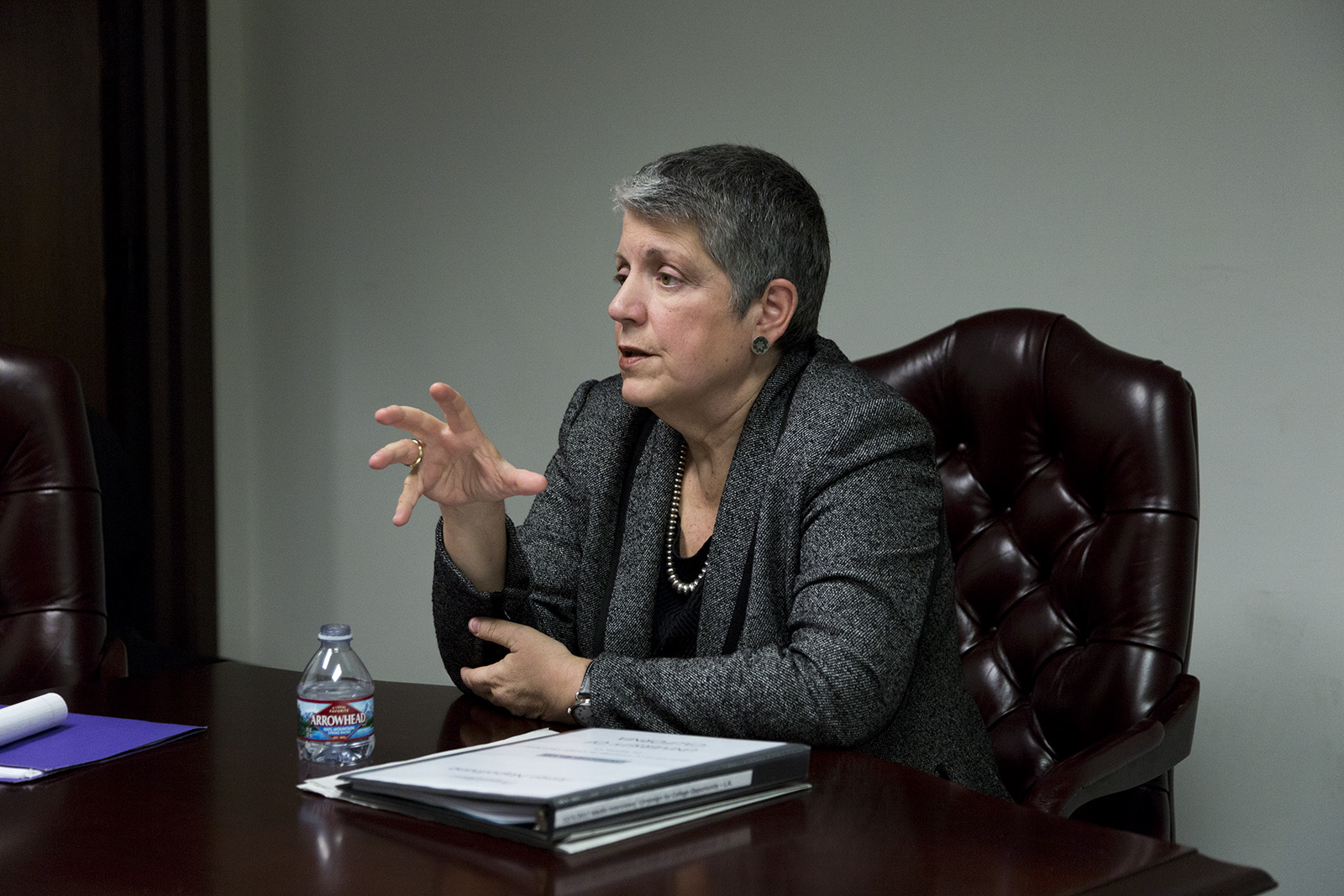UCOP’s revised SVSH policy expands on live hearing processes, accuser protections

Janet Napolitano, president of the University of California, announced revisions to the University Sexual Violence and Sexual Harassment Policy earlier this month. Changes detailed a new structure for investigating complaints. (Daily Bruin file photo)
By Shelby Dunagan
Aug. 25, 2019 11:34 p.m.
The University of California Office of the President revised its sexual violence and sexual harassment policy Aug. 1, which detailed a new structure for investigating complaints.
In January, an appellate court ruled that California colleges and universities must hold live hearings to resolve certain sexual misconduct cases. UCOP made immediate changes in order to comply with these rulings and issued an interim policy in March.
Janet Napolitano, president of the University of California, announced the newly revised version of the policy, including Appendix E of the Policies Applying to Campus Activities, Organizations and Students, which deals with live hearings and the credibility of both parties and witnesses.
Key revisions to the SVSH policy include changes to definitions of sexual misconduct, extension of the formal investigation process from 60 days to 90 days, changes to improve clarity and a provision for the Title IX officer to initiate investigation under certain circumstances without a clearly identifiable accused or accuser.
The revised Appendix E focuses on the implications and processes of the live hearing model.
The UC’s sexual violence and sexual harassment policy details the formal procedures for resolving complaints of misconduct when the accused are students. Appendix E specifically outlines the five stages of sexual misconduct cases, including reporting, investigation, opportunity to contest, hearing and appeal, and what procedures are required in each stage.
The live hearing model allows either party to propose questions to be asked of each other and witnesses during the hearing. However, the hearing officer first screens the questions to ensure they are relevant, and not harassing or unduly repetitive, according to the UCOP website.
Various measures, such as possible physical or visual separation of the parties involved and the ability to have an advisor and support person, are in place throughout the process, according to the UCOP website.
UCOP spokesperson Elisa Smith said in an email statement that UCOP wants to ensure an investigation process that resolves allegations of sexual violence and sexual harassment with respect and compassion.
Smith said UCOP sought a wide variety of input from students, faculty and staff across the UC system to best inform its decisions.
“Through a process that began in spring 2018, the Systemwide Title IX Office sought and received significant input on UC’s 2016 SVSH policy from students, faculty and staff from across the system,” Smith said. “The office considered all of the input carefully, and consulted on responsive changes with Title IX officers, Student Conduct directors, CARE directors and Respondent Services Coordinators; and the Title IX Student Advisory Board.”
Despite UCOP including several measures that attempt to promote the well-being of students, some students said they are still concerned that the live hearing model is not efficient and will deter affected students from reporting.
Atreyi Mitra, a researcher on sexual violence and sexual harassment for the UC Student Association and a third-year human biology and society student, said she worries the UCLA Title IX office does not have the capacity to switch to the live hearing model.
“The office is already overwhelmed with the caseload they have,” Mitra said. “My hope is that UCLA will work to better staff and support the Title IX office so that it will be able to handle these new changes as well as conducting investigations in a more timely manner.”
Mitra said the revised policy does consider students’ safety, but she still fears the exacerbation of underreporting due to the enforcement of traumatic live hearings.
“Their new measures strive to ensure student well-being through options for the complainant such as visual or physical separation, the ability to take breaks and the presence of an advisor or support person,” Mitra said. “That being said, I still believe that the new model will make it harder for students to report to Title IX.”
Since the new revised policy’s announcement and the appellate court’s decision, several former students accused of sexual misconduct have sued the UC, alleging they had a lack of due process and unfair treatment during their Title IX cases that occurred between 2016 and 2017.
These students believed UCLA denied accused students fair treatment through the normal judicial process in Title IX sexual misconduct proceedings. Their cases were investigated by an individual, and did not receive a live hearing, which the revised Appendix E could have granted.
Lily Lee, a second-year environmental science student, said she believes requiring live hearings in sexual misconduct cases does not create a safe environment for students.
“Requiring live hearings is just another way to attack the courageous victims who report their abuse, and discourage more abuse victims from reporting,” Lee said. “I do not think live hearings make trials more fair, but rather perpetuate a larger culture of victim shaming.”


